Desperation Trumps danger
Risky escape bids to Canada a way out of the darkness for terrified members of Little Mogadishu in Minneapolis
Advertisement
Read this article for free:
or
Already have an account? Log in here »
To continue reading, please subscribe:
Monthly Digital Subscription
$0 for the first 4 weeks*
- Enjoy unlimited reading on winnipegfreepress.com
- Read the E-Edition, our digital replica newspaper
- Access News Break, our award-winning app
- Play interactive puzzles
*No charge for 4 weeks then price increases to the regular rate of $19.00 plus GST every four weeks. Offer available to new and qualified returning subscribers only. Cancel any time.
Monthly Digital Subscription
$4.75/week*
- Enjoy unlimited reading on winnipegfreepress.com
- Read the E-Edition, our digital replica newspaper
- Access News Break, our award-winning app
- Play interactive puzzles
*Billed as $19 plus GST every four weeks. Cancel any time.
To continue reading, please subscribe:
Add Free Press access to your Brandon Sun subscription for only an additional
$1 for the first 4 weeks*
*Your next subscription payment will increase by $1.00 and you will be charged $16.99 plus GST for four weeks. After four weeks, your payment will increase to $23.99 plus GST every four weeks.
Read unlimited articles for free today:
or
Already have an account? Log in here »
Hey there, time traveller!
This article was published 17/02/2017 (3221 days ago), so information in it may no longer be current.
MINNEAPOLIS — It’s early evening at a place nicknamed the Somali Starbucks, a coffee shop in a district of Minneapolis known as Little Mogadishu.
The customers, all men, are gathered in clutches around tables. There is a cacophony of voices involved in animated discussions. A reporter from Winnipeg on a mission to find out why Somalis from this city are risking their lives to walk across the Canadian border at Emerson — in the dead of night, in sub-zero temperatures — sits down in front of a man at random, off by himself.

At the mention of the word “Winnipeg,” men at the next table suddenly turn their heads.
And within seconds of introductions, the man, 36-year-old Abdirahim Adar, opens up.
“I’m thinking of coming to Canada,” says Adar, a truck driver. “When we come here, we thought we were safe, starting a new life. If you’re living here and you’re Muslim and you’re black and you’re a minority and the president of the United States says you shouldn’t be here, you’re scared. That’s why people are running.
“The head executive is saying, ‘We don’t want you here.’”
Adar is, of course, referring to Donald Trump, who issued an executive order to ban travel from seven Muslim-majority countries — including Somalia — last month, just a week after his inauguration.
That order was subsequently stayed by the courts, but Trump has not said whether he plans to fight on or issue another. Uncertainty and unease are palpable in a city called the “Somali capital of America.”
Adar says the only thing preventing him from leaving a place he has called home since 2000 is his wife, of Norwegian decent, and his youngest son, who is five years old.
“If they were Somali, I’d say, ‘Let’s get out of here before Trump gets us.’ If I didn’t have kids I wouldn’t be here today. We’ve been pushed out to the edge. People are scared. They want to run away. Are they going to put us in (an internment) camp like the Japanese (during the Second World War)?”
Here’s the thing: Adar is a U.S. citizen. He’ll proudly show you his card, tucked in his wallet with a picture of his son. Unlike the desperate dozens who have crossed the border into Emerson in the last month — mostly undocumented or without green cards or whose asylum claims in the U.S. have been denied or pending — Adar is as American as apple pie.
It’s just that he is a Muslim born in Somalia. And for a large percentage of the tens of thousands of Somalis in Minnesota, that is reason enough to worry.
“I wouldn’t be running from the people of Minneapolis. They are like my family,” Adar insists. “I’m running from the person who says, ‘We’re going to put you in a cage.’”
● ● ●
To understand why a tiny Manitoba hamlet of 700 residents has become the funnel for African asylum seekers, look no further than the intersection of Riverside and Cedar avenues in Minneapolis, just west of the Mississippi River.
The area — Little Mogadishu or Little Somalia — is home to the largest Somali population in the United States. It’s estimated that at least 10,000 people of Somali descent live in this few square miles alone. Although census estimates that upwards of 30,000 Somalis live in the Twin Cities — and some 70,000 across the state — community members will tell you the number is at least double the official figures.
Somalis, they say, are often loath to fill out government census forms.
Soaring above the intersection is the Riverside Plaza apartment complex, ground zero for Somali immigrants since they began flooding into the city in the early 1990s, when civil war first erupted in their homeland.
The six apartment blocks, built in the 1970s, were once luxury condos. Of note, the image of the complex was portrayed on the opening credits of The Mary Tyler Moore Show, as the home of Mary Richards.
But Mary doesn’t live here anymore. Instead, it’s Ali or Mohamed or Halima.
By the 1980s, the area was overrun with crime. The apartment complex had an occupancy rate of 30 per cent. They were called “Crack Stacks.”
“It was a no-go zone,” says Abdi Warsame, the first Somali (and Muslim) to be elected to Minneapolis city council.
But the first wave of Somali refugees, mostly adult men, began to move in and found employment in factories and on assembly lines — jobs that required little English and no specific skills.
They gained a foothold, and their families and relatives quickly followed. The irony of immigrants flowing from one of the hottest climates on Earth to a city in northern United States was immaterial. They had jobs and a future. Their families grew, and so did their roots.
“There’s about 100 business places around and four places of worship,” Warsame says, sitting in a coffee shop in the shadow of the apartment complex. “It’s a very successful turnaround.
“We are the drivers of small business in Minneapolis, us and the Latinos. Around 55 per cent of small businesses are immigrant-owned.”

But the mood changed abruptly on Nov. 6, when Trump held a rally at the Minneapolis airport — attended by a crowd of some 10,000 supporters — and declared that Somali refugees were “a disaster taking place in Minnesota.”
Trump cited documented incidents of young Somali men from Minnesota who had been radicalized to fight for Islamic State or al-Shabaab, a terrorist group that operates in east Africa. He highlighted “the recent terrorist attack in St. Cloud,” where a 20-year-old Somali American stabbed and injured 10 people in a mall last September before being fatally shot by a police officer.
“Here in Minnesota, you’ve seen first-hand the problems caused with faulty refugee vetting, with very large numbers of Somali refugees coming into your state without your knowledge, without your support or approval,” Trump said, two days before the presidential election. “Some of them (are) joining ISIS and spreading their extremist views all over our country and all over the world.
“It’s horrible what they’re doing and if you want people to pour in Minnesota all you have to do is vote for Hillary Clinton.”
Trump lost Minnesota, a traditional blue state, by 40,000 votes. But the message sent a chill through Minnesota’s Somali community.
The subsequent travel ban executive order only served to ramp up anxiety.
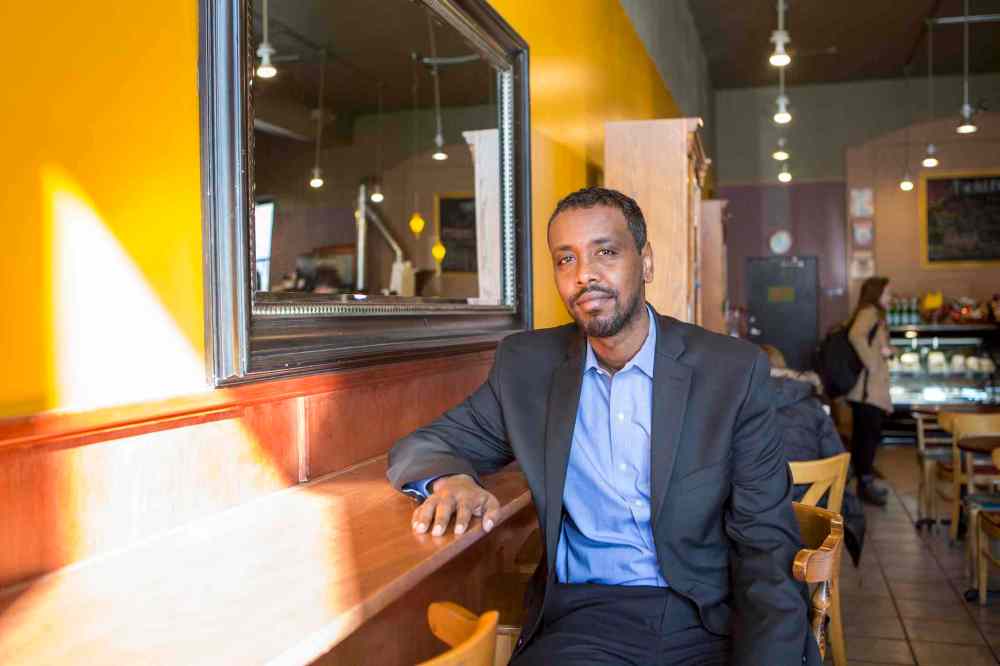
“I’ve never seen anything like the current political situation,” Warsame says. “(Even) naturalized citizens are afraid of Trump. On our passports it says, ‘Place of Birth — Somalia.’ So a lot of people are afraid of travelling. We’ve been to the dark age in history. People might look back on this and say this is the rise of fascism across the Western world. So there is a lot of fear.”
Somali-born residents with U.S. citizenship wonder if they will ever seen family members again. What if they can’t leave the country?
“There’s a range of emotions,” Warsame adds. “I mean, the most powerful man in the world, the president of the United States, came to our state and singled out our community. And he only lost by 40,000 votes.”
To Warsame, the entire attitude towards refugees from any nation has turned upside down. He left Somali as a boy for London with his single mother.
“There were different standards,” he says. “The world was much more accepting. The most vulnerable people were the ones that were taken care of. Now you have a different situation where the most vulnerable are being prevented from coming into the U.S.”
Now 38, Warsame moved to Minneapolis 10 years ago. He explains that “in the Somali diaspora, there are three important cities in the Western world; there’s London, there’s Toronto and there’s Minneapolis.”
Warsame chose Minneapolis. He now has three U.S.-born children.
Yet even as a successful elected official and proud American, he is — for the first time — questioning his future here.
“So of course I have more fear now than I ever did,” he says. “And I do think of taking my kids elsewhere. Can I stay here with the (anti-Muslim) rhetoric? I’d never thought of that. This was safe, this was home, this was a vibrant community.
“(But) as a parent, my main responsibility is to my family, to my small children, who are very vulnerable. You worry about them. Even going to school, issues of bullying. I want an environment that can nurture them, where they can really learn and focus. Not second-guess that, ‘Oh, this kid might not like me because I’m Muslim.”
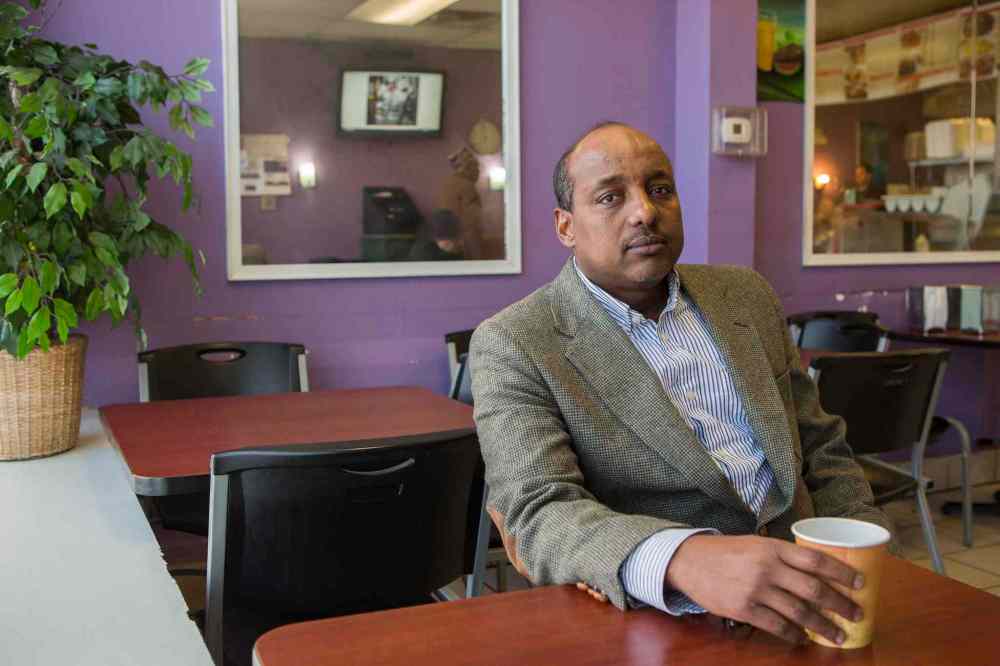
Omar Jamal, an outspoken and often controversial activist for the Somali community in Minneapolis, is characteristically blunt about the current climate for Muslims in Trump’s America.
“Basically, what you have here is a completely unconventional war,” Jamal says. “They (the U.S. government) don’t know their enemies. Everybody is a potential suspect. At the same time, the feeling in the U.S. government is that they’re losing the war on terror. Their empire is collapsing. And you have an emperor who’s going crazy… because he thinks he’s losing the war and… they’re running around like crazy arresting people.
“It’s the most dangerous moment in history. So immigrants get caught in the middle, especially Muslim immigrants. That is the sense of feeling everybody has; what are we going to do? And that’s where Canada comes into the picture. How will they be able to handle this influx of nervous, fearful immigrants running in every direction? They’re running for their lives.”
Remember, Jamal says, the ban originally included green-card holders.
“So nobody’s safe,” he says. “The word on the street right now is not to leave the country, because maybe you’ll not be able to come back. You simply don’t know what this administration will do. You’re playing a different ball game.”
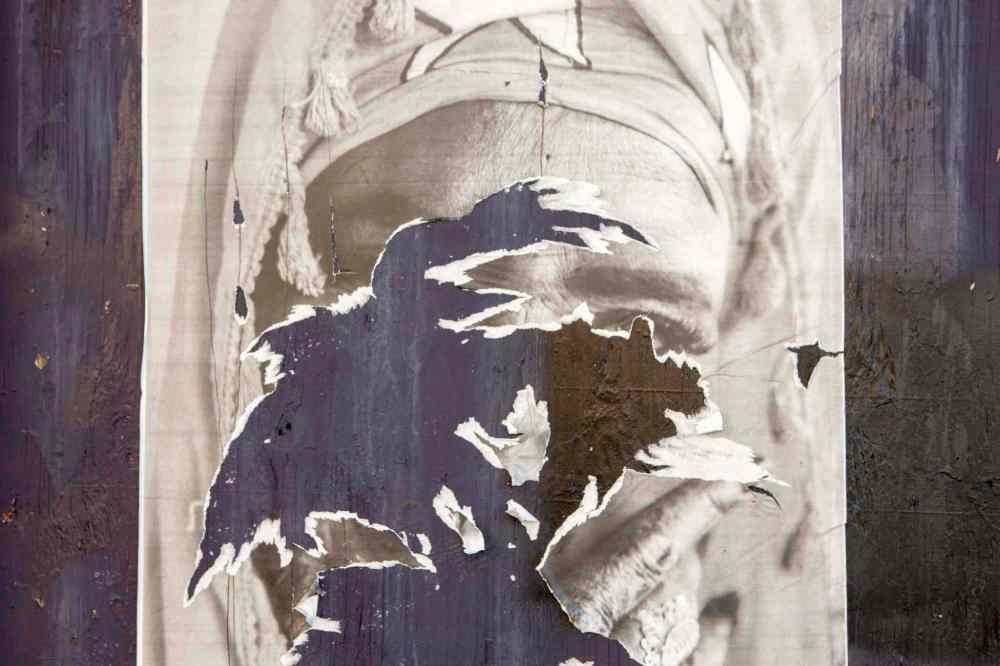
So who are the men, woman and children braving the risks to walk into Canada, not just at Emerson, but in increasingly large numbers along Ontario and Quebec borders?
An estimated 2,000 people arrived in Canada “irregularly” — meaning not via a border office — in the last nine months, including 430 in Manitoba. In the 2015-16 fiscal year, 340 arrived in Manitoba irregularly. More than 60 have crossed into Emerson in the last three weeks.
They have usually either been denied asylum in the U.S. or their applications are pending. Some might have a criminal record, even for minor charges.
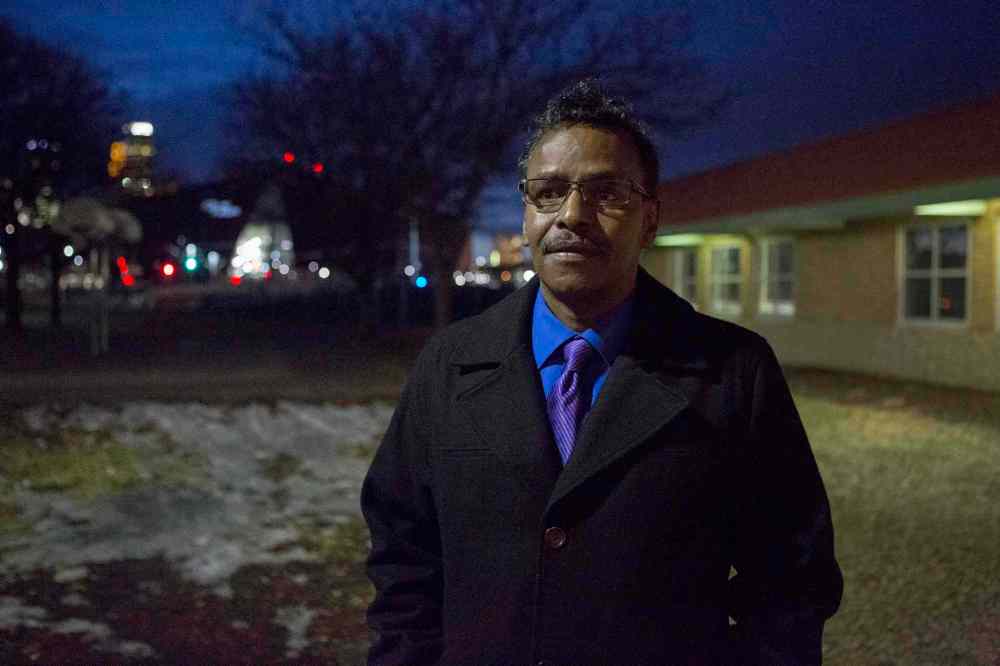
They might have temporary green cards, allowing them to work, but are told they could be eligible for deportation at any moment.
“There’s a lot of fear that those who came here for asylum, and are pending cases, that their chances with Trump are almost nil,” says Abdirizak Bihi, director of the Somali Education and Social Advocacy Council.
Bihi says these individuals with uncertain status have been on journeys that have taken them years to get to Minneapolis. Many have been detained for months. They have criss-crossed continents.
They have travelled by foot. By camel. By boat.
Bihi says he recently encountered one man who had travelled through 28 countries before finally arriving in the U.S. That man is among the growing number who crossed at Emerson in the last month, he was told.
Mohamud Noor, interim director of the Confederation of Somali Community in Minneapolis, blames a rise in Islamophobia for the surge in border-jumpers.
“That is what’s driving people to think twice,” reasons Noor. “They’re willing to take the risk to cross the border, however treacherous it might be.”
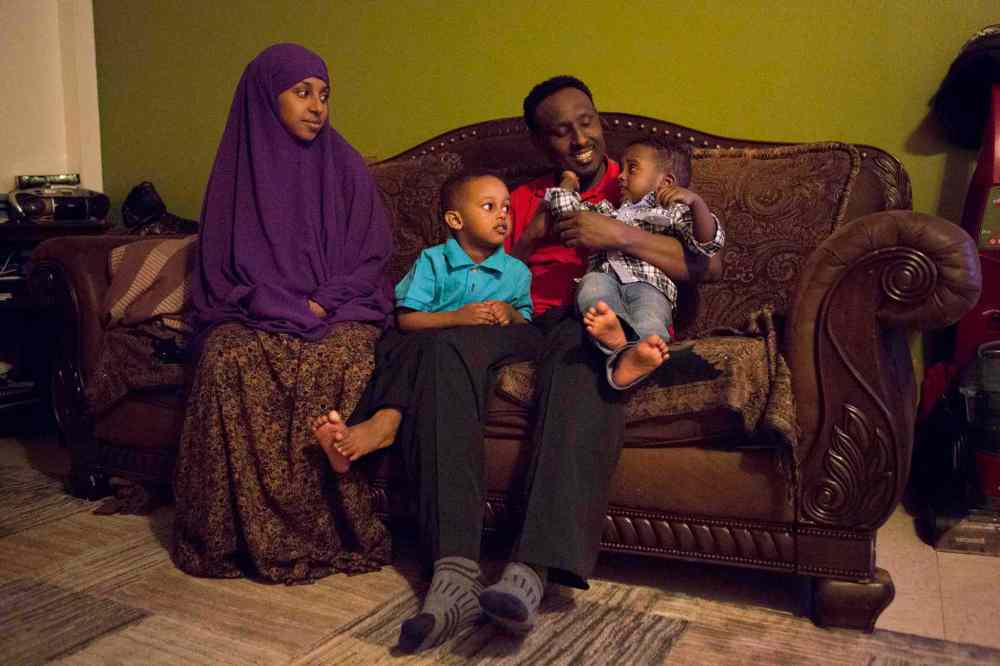
Kamal Mohamed can relate. The 43-year-old was in Somalia the day Trump issued the travel ban. He was there to pick up his wife and two children and return to Minneapolis. His wife, who has a green card, wasn’t allowed to board the plane.
But the day the order was stayed, they were on the first plane back home.
“I would have gone to Canada if I didn’t have legal status here,” says Mohamed, who has lived in Minneapolis for the last two decades. “You could get deported tomorrow.’
“People who are settled here, we’re happy. They are home-owners, elected officials, teachers, doctors, everything.”
But the border-jumpers?
“After what they have gone through to get here, coming through the (Canadian) border is easy. Walking through snow for three hours, that’s nothing.”
Adds Bihi: “Imagine going through 28 countries and avoid being stopped. These people are nomadic by culture. Camel herders. They know how to travel. There’s no mountain too big.”
• • •
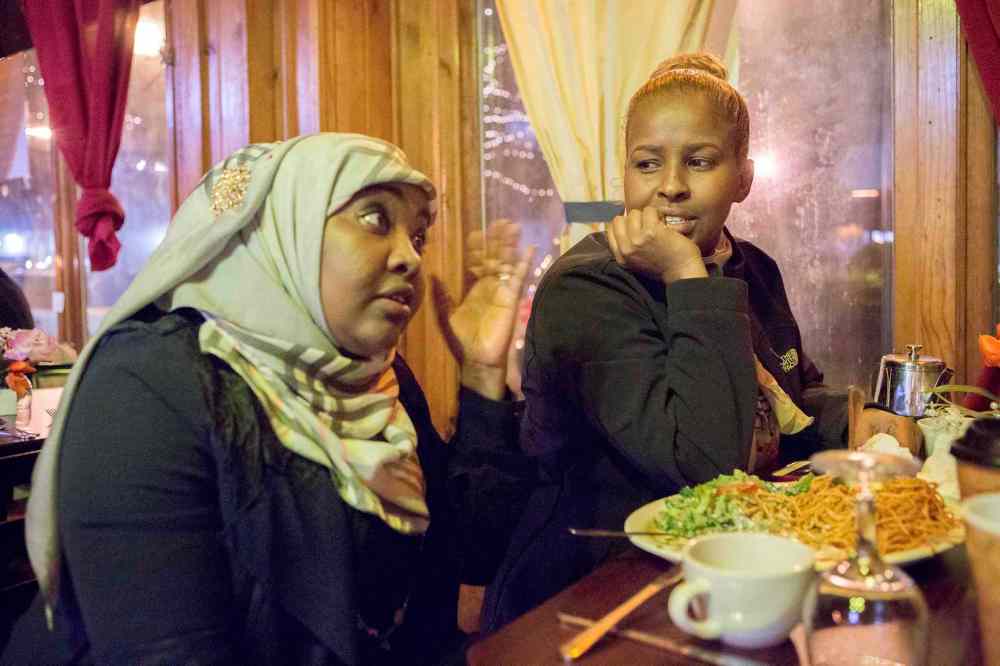
Saciido Shaie is sitting in a Somali restaurant on Lake Street, yet another district a few kilometres from Cedar and Riverside being transformed from crime-ridden to gentrification. Beside her is Farhio Kalif, founder and executive director of Voice of East African Women.
The two women are outgoing and quick to laugh.
Shaie will say, only half-joking, that she has an explanation for the increase in Somalis seeking asylum to the north.
“They have Trump anxiety. It’s a new disease,” the youth leadership co-ordinator says. “The only medicine they have is to go to Canada.”
Then Shaie and Kalif mention a man named Mohamed, a friend who often frequented the same restaurant over the last year.
“He was sitting there every night,” Shaie says, pointing to a nearby table.
Mohamed didn’t show up two weeks ago. A couple of days later, he called Shaie and told her he was in Winnipeg. “I thought he was joking,” she says.
Turns out Mohamed had a meeting scheduled with immigration officials about his asylum status on Wednesday. He had a temporary work permit, but could be deported at any time.

Without a word, he fled for the Emerson border. “It’s so scary,” Kalif explains, “you don’t even trust your own family and friends.”
Mohamed called Shaie again earlier this week to let her know that he had flown to Toronto to stay with a friend. A reporter asks if she had his number.
She does, calls him on the spot and hand the phone over.
“I’m OK,” he says. “I’m happy now.”
Mohamed says his hearing for asylum in Canada is scheduled for early April. But the phone line isn’t great and Mohamed can’t understand the reporter’s questions. So Kalif translates.
Mohamed says he was driven to the border by a Somali friend from Minneapolis, along with another Somali man who had just arrived from California. The friend dropped them off and kept driving.
It’s worth noting that the surge in border-jumpers is now being commonly referred to as the Underground Railroad, harking back to the period in the early- to mid-1880s when thousands of African-American slaves fled the U.S. via a network of secret routes and safe houses.
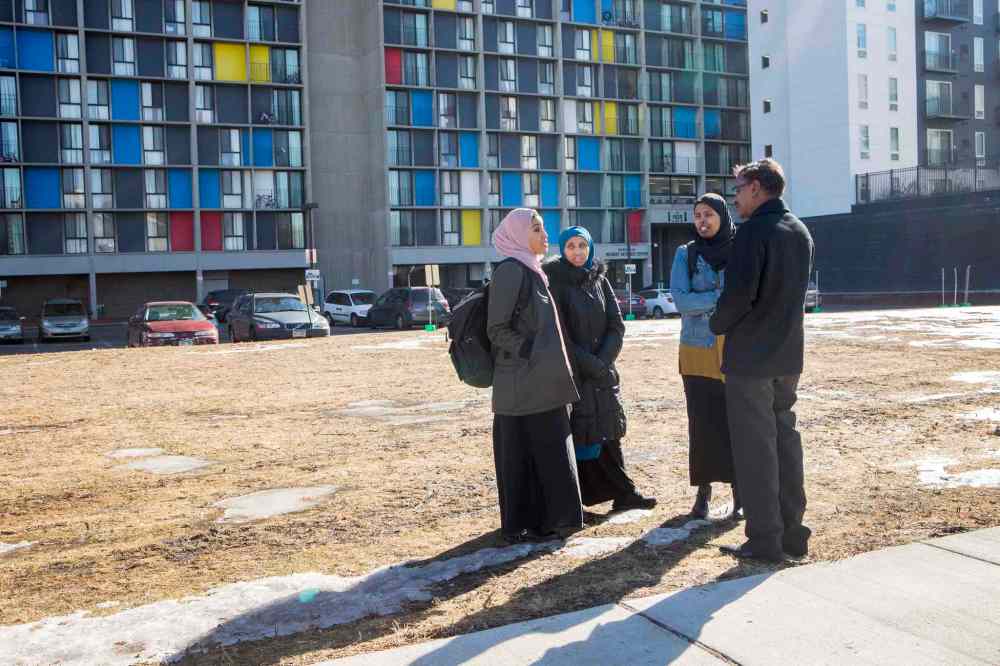
But in the 21st century version, the methods of escape vary.
“Any means available,” Jamal says. “Buses. Cab drivers. Pay a driver to get them there, for $500, $600.”
Some seeking asylum have told reporters that they took a bus from Minneapolis to Grand Forks and simply asked a taxi driver: “Where is Canada?” There are rumours that passage can be found, for a price, at popular gathering places for Somalis, such as Karmel Square shopping mall.
Two weekends ago, however, 16 refugee claimants arrived at the Emerson border for the first time on a bus.
Most arrangements, according to community leaders in Minneapolis, are made in whispers. Sometimes the drivers are smugglers, sometimes friends or family. Or the aforementioned taxi drivers closer to the border.
Shaie says she wishes Mohamed had stayed in Minneapolis, but is not shocked that he left.
“I’m happy for him,” she says. “He’s safe.”
After all, Kalif adds, there are so many rumours swirling around the community about arrests, jailings and deportations — even if they are unfounded — that are affecting decisions of those whose status is uncertain.
“People are talking and fear is growing,” she says. “The opportunity is there, now or never. The threat is there. They take it serious. They’re going to run.”
If Mohamed’s application for refugee status in Toronto runs into complications, Shaie smiles and adds, “We’re just going to have to call our immigration minister.”
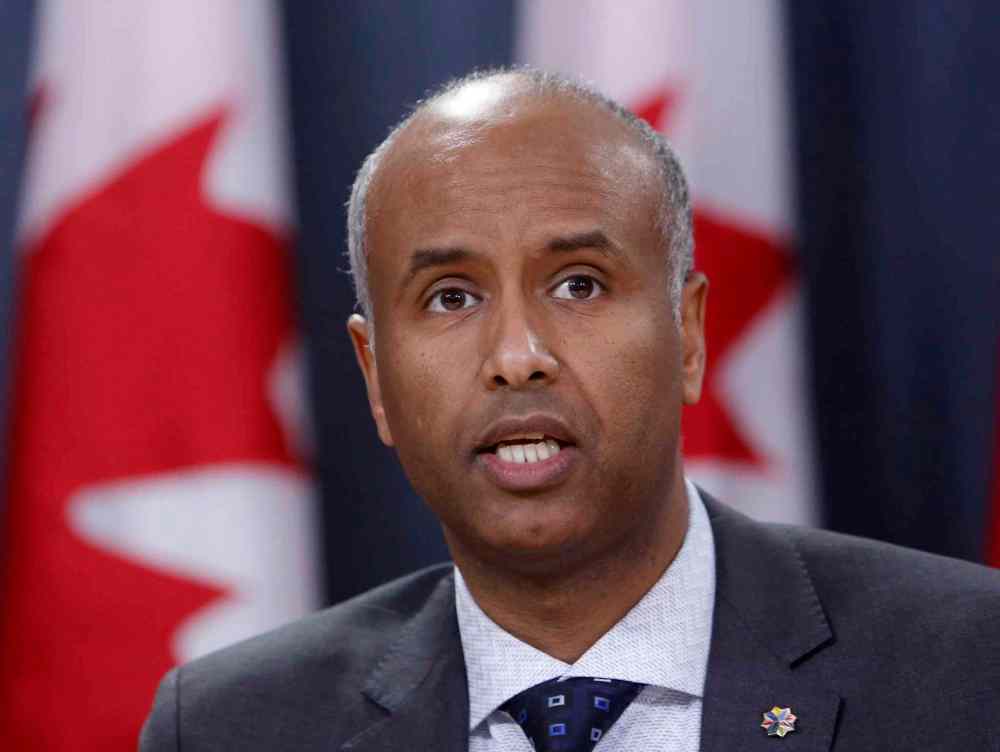
Shaie is referring to Canadian Immigration Minister Ahmed Hussen, who currently holds the highest political office of any Somali-born resident in North America.
This is not unimportant, in terms of the lure of Somalis into Canada. During an interview with Warsame, the city councillor pulls out the latest edition of the African Journal, published in the Twin Cities, which features a front-page article on Hussen. There is a photo of the federal minister on one corner and the Canadian flag on the other.
Then there’s Prime Minister Justin Trudeau, who Bihi calls “the Prime Minister of Somali Americans.”
Trudeau’s is a popular man in the Somali community, based on the belief that he welcomes refugees. Many cite his recent tweets in the wake of Trump’s executive order, that Canada would not turn down anyone “fleeing persecution, terror (and) war” because, “Canadians will welcome you, regardless of your faith. Diversity is our strength.”
“I love that man,” Shaie says.
“Give him a hug for us,” adds Kalif, who follows Trudeau on Twitter.
• • •

As the conversation with Kamal Mohamed comes to an end, he stands up to leave and adds, for the record: “On behalf of the Somali community, I want to thank Canada for opening their doors when the refugees need the most help. Thank the prime minister. Thank the Parliament. Thank the Queen.”
He’s not joking.
But it’s also true that there are Somali-Americans who not only voted for Trump, but were part of the Minnesota delegation that attended the Republican convention in Cleveland last summer to nominate him as the GOP’s presidential candidate.
Why?

“The way he speaks is the Somali way,” Bihi says. “Somalis are not very politically correct. They think he’s better than others. He said what others believed.”
Bihi explains a Somali proverb: Don’t fear the hyena who laughs the loudest, fear the hyena who doesn’t laugh at all, because you can’t hear him coming.
Back in the Somali Starbucks, a man named Ali, who says he is a self-employed businessman, shrugs off Trump’s anti-Muslim rhetoric.
“Trump is a politician,” he reasons. “A politician has to play the game. Do you think that’s something new? It’s just a bit elevated.”
Ali is a 45-year-old black Muslim man with an accent. He has dealt with racism all his life. The critical response to the current political climate, he said, is to communicate. To reach out and get involved.
“I don’t see the Republican party as the enemy of Islam,” he says. “It’s my job to tell them I’m not a bad guy. It’s my job to reach them. I’m not here to change America. I’m here to contribute, to learn, to grow.”
As for Canada, Ali simply asks, “What’s the difference? Don’t you have liberals? Don’t you have (political parties and voters) on the right? Don’t you have racism?”
So political rhetoric doesn’t bother him, he insists.
“Even if it’s coming from the president?”
He smiles.
“Even if it’s a Canadian,” he replies.
• • •
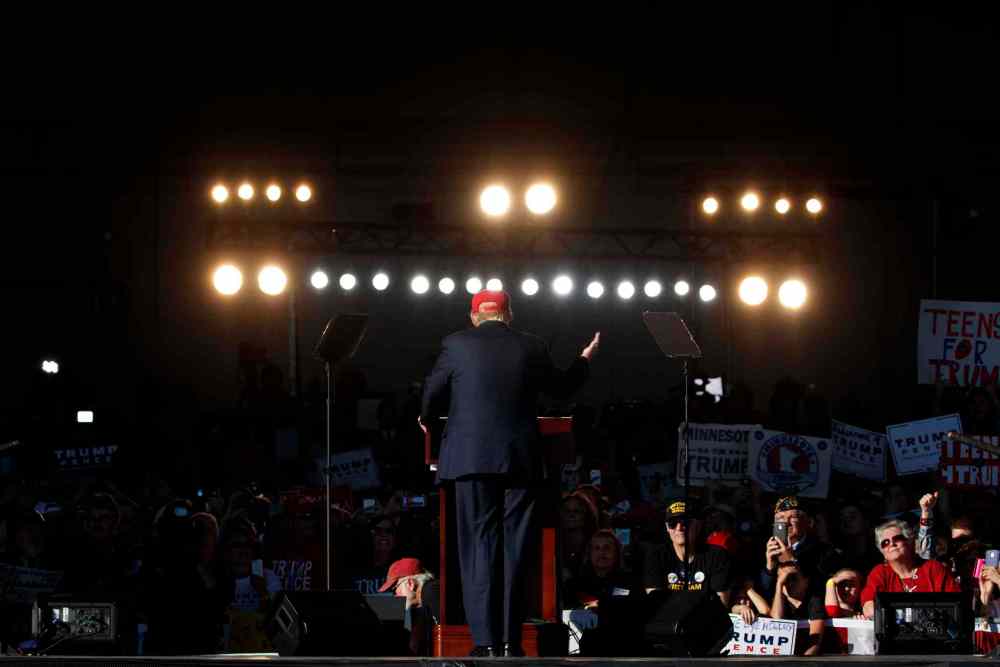
Men are trickling into a mosque in Little Somalia. It’s time to pray.
A group of elders, who agree to be interviewed, tell the Winnipeg reporter there have been a few men — whom they did not know — who had come into the mosque recently to ask about getting to Canada. They were looking for information.
“They were afraid to be returned to the same catastrophic place (Somalia) they ran from,” says Nur Samatar.
The elders had no information to offer, and the men never returned.
Ali Jama, another elder, says he trusts that the U.S. Constitution will protect Muslims, regardless of who is sitting in the Oval Office. “We want to send a message to the president to stop this,” he said. “It’s inhuman to create such fear.”
Jama then cites the thousands of fellow Americans who have taken to the streets to protest the travel ban — including 10,000 who recently marched in the streets of Minneapolis.
“When I looked at them, they were fighting for Muslim people. And they weren’t Muslim,” he says. “That gives us a lot of hope that we are not isolated. That tells you all religions work together for humanity… whether they’re Jews or Christians or Muslims.”
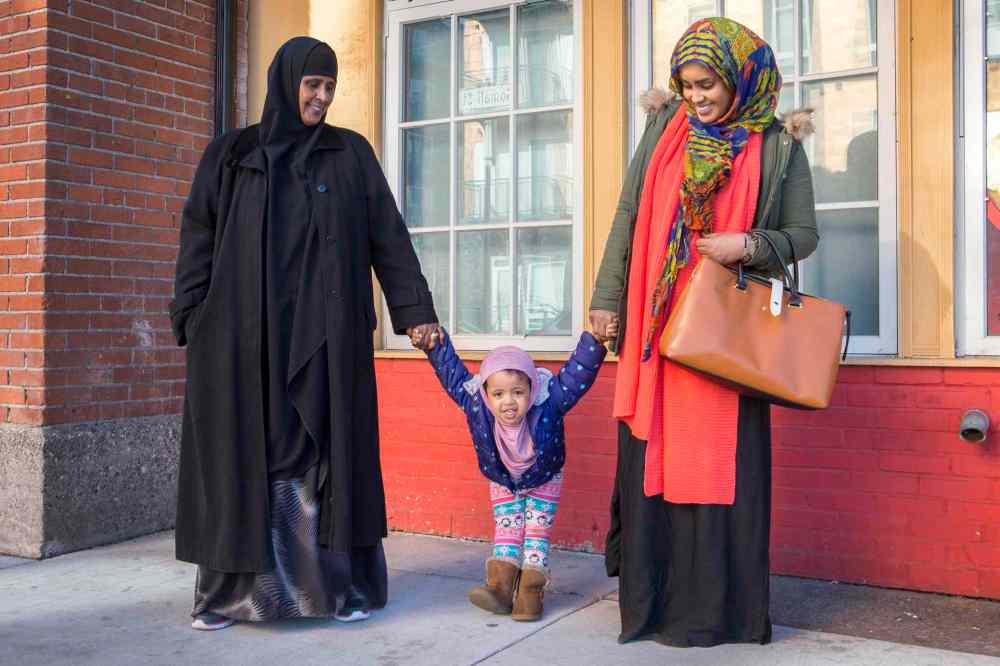
Outside the mosque, a woman named Mulki, who is with her young daughter and grandmother, is hopeful, too.
“The situation is horrible,” she says. “But we are citizens. I’ve never felt like less of a person. The United States is made of generations of immigrants. It just a matters who’s here first. This too shall pass. It will get better.”
As for the number of Somalis seeking refuge in Canada, Mohamud Noor believes the current spike will soon level off.
“It’s in the news,” he says, referring to the global coverage the plight of the asylum-seekers walking into Emerson has received. “It’s being driven by the media now.”
Almost as if on cue, the interview with Noor is interrupted by a Washington-based TV crew from CCTV, China’s state television network, to speak with him on the same subject.
Jamal, however, disagrees.
“It’s going to get worse before it gets better,” he says. “I think Canada will see a huge number of immigrants rushing towards the border illegally.”
Regardless, those in this community who have no plans to leave insist that the only way to relieve the tension is to redouble efforts to get their message out to the general public: their journey, the reasons why they fled Somalia in the first place and the strides they’ve made integrating and contributing to their new homeland in the last two-plus decades.
“Now I see the children who were born here graduating from college, running businesses, leading community organizations, working as police officers,” Bihi says. “It’s a whole different world.”
Adds Kalif: “We’ve changed the face of the Twin Cities. People are working hard. They’re paying taxes. We have political offices, volunteering so much time. You don’t see these things in the media.”
In the end, Warsame concludes, Somali immigrants have already fled from war and persecution. It took many of them a long time to get here. And they’ve sacrificed too much to see their future in their new home threatened, too.
“We don’t want any part of it,” he says. “We didn’t create these issues in the Middle East. We just want to live the American dream. We love this country. We just want to stay here. But the political tectonic plates keep shifting under our feet.
“We’re just ordinary people trying to live ordinary lives.”
randy.turner@freepress.mb.ca
Twitter: @randyturner15
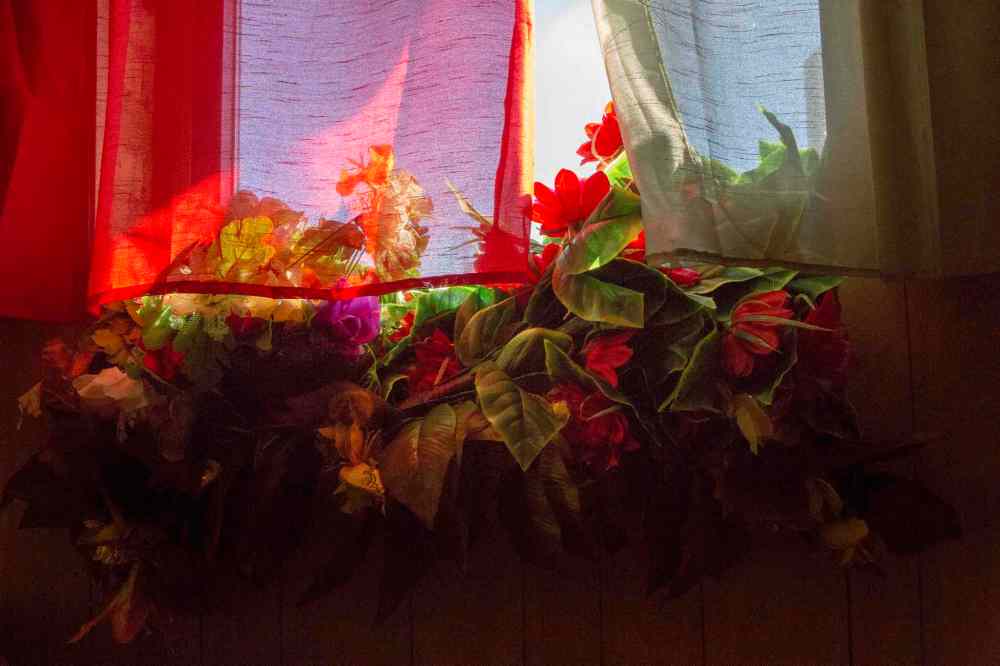

Randy Turner
Reporter
Randy Turner spent much of his journalistic career on the road. A lot of roads. Dirt roads, snow-packed roads, U.S. interstates and foreign highways. In other words, he got a lot of kilometres on the odometer, if you know what we mean.
Our newsroom depends on a growing audience of readers to power our journalism. If you are not a paid reader, please consider becoming a subscriber.
Our newsroom depends on its audience of readers to power our journalism. Thank you for your support.
History
Updated on Friday, February 17, 2017 3:18 PM CST: Fixed thumbnail.




